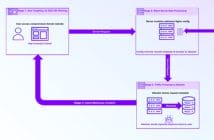
Research from OpenText finds Australians are behind in AI, compared with Europe and North American counterparts
Artificial intelligence (AI), associated with the fourth industrial revolution, is no longer science fiction – it’s here and disrupting many sectors like healthcare and automobile. However, according to the latest research from OpenText, the majority of Australians remain cautious or unaware of the opportunities provided by AI in their daily lives, with only 1 in 5 respondents (18%) aware of having been in contact with a form of AI in the last 12 months.
Despite voice assistants like Siri and Alexa growing in popularity, the survey of 1,000 Australians found that most are not yet convinced by AI, even if they’ve likely interacted with it on their mobile or via chatbots. In fact, only 21% said they are excited about the technology, and 19% stated that AI makes them nervous.
AI in government – a short-term reality?
- 40% of Australians believe that AI will enter government within 5 years
- 27% believe that AI would make better decisions than elected government representatives, but want humans to make final decisions.
Respondents recognised the value of intelligent automation in reducing waiting times, admin and errors within the public sector. As such, the majority (56%) of respondents are convinced that the Government will work with robots within 10 years. This is higher than the USA (where only 38% think this will occur in the next 10 years) but contrasts to the Netherlands; where 73% believe robots will be in the public sector within the next 10 years.
AI at work – are we ready to work with robots?
- More than 1 in 3 (39%) Australians are ready to work alongside a robot
- 25% would encourage their employer to leverage robots if it meant reducing their day-to-day admin tasks
The research revealed few concerns about robots taking over jobs. Only one in ten (11%) respondents are worried that their job could be replaced by a robot, and the majority (56%) are convinced their role will never be taken over by automation. This suggests a greater inclination to work alongside robotic or intelligent technology.
AI in healthcare – more precise and faster diagnosis
- 28% of Australians think that AI makes it possible to obtain more accurate diagnoses, while 21% believe it can deliver faster results
- Over 1 in 3 would trust a diagnosis via artificial intelligence
The research found that Europeans may be further along their AI journey; with 55% of respondents in Spain, 48% in France, and 47% in the Netherlands, suggesting the key benefit of AI in healthcare is its preciseness. Australia ranked on par with American, Canadian and UK consumers; with 24%, 26% and 26%, respectively.
AI and automotive – self driving a way off
- 1 in 3 believe (32%) autonomous vehicles would make roads safer
- Only 24% would be comfortable in an autonomous or self-driving vehicle
One in three respondents (30%) were adamant that there would never be more autonomous cars on the road than “normal” cars. A further 45% percent said they would never consider buying a driverless car or renting one on a per-use basis.
Commenting on the findings, Mike Lord, Vice President, Australia & New Zealand at OpenText, said “AI technology is here to stay. Businesses are turning to digital transformation, healthcare organisations are embracing medical technology innovations and, as a result, AI is filtering into every aspect of our lives. More and more Australians are seeing the benefits this will bring to the workplace and our wider lives. By performing more menial, repetitive tasks, automation and robotics allow us to be more efficient and save time.”
Lord concluded: “Sci-fi movies tend to distort the consequences of AI technology. It’s time to stop viewing AI as an existential threat to our livelihoods and our health. AI will transform the workplace, as menial tasks are digitised through robotics and process automation, but AI will never replace people. The true value of AI lies in its ability to work alongside humans to relieve work pressure, but also in the health system, with the goal of bringing comfort to everyday life.”





